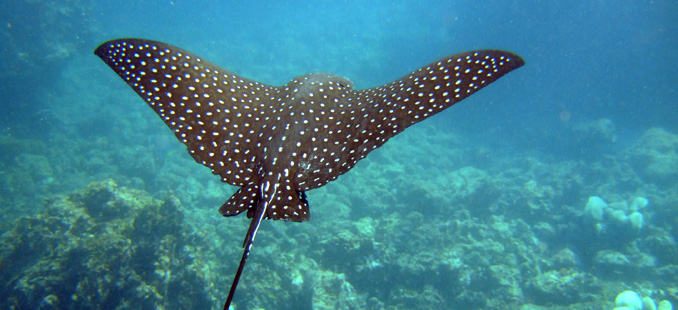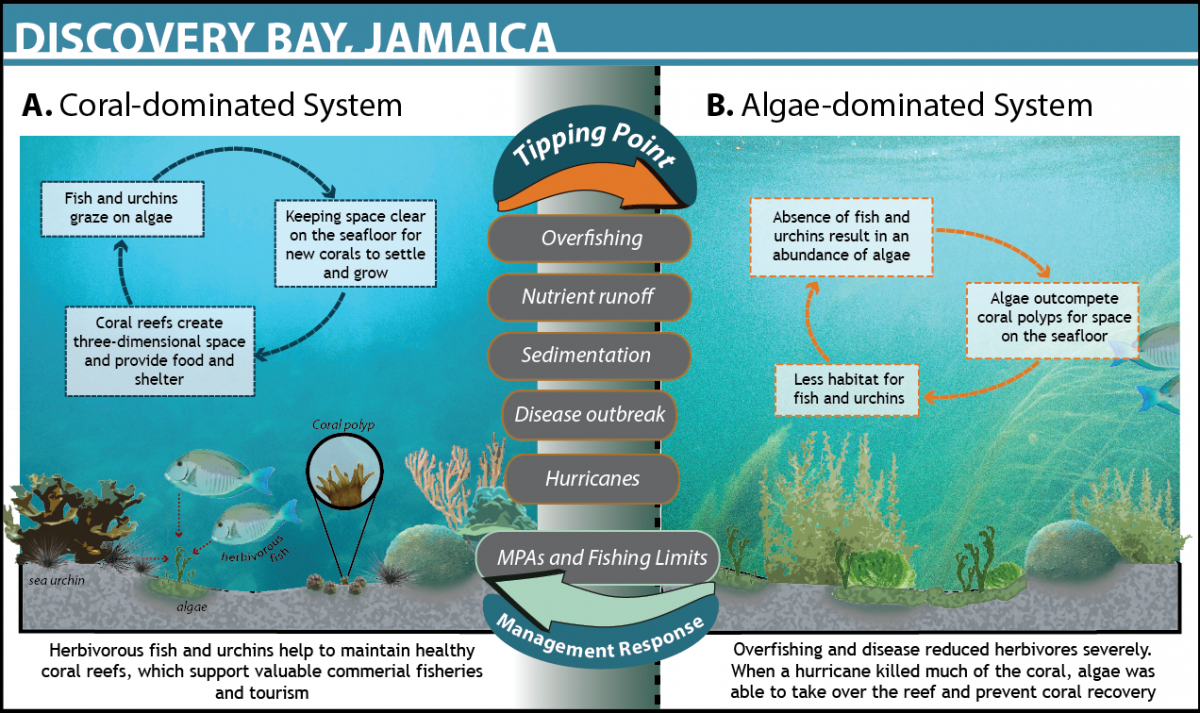Loss of herbivores to disease and overfishing combined with nutrient runoff and hurricanes to push reefs over the edge in Jamaica
Coral Reef Tipping Points in Discovery Bay, Jamaica
Coral reef ecosystems harbor the greatest diversity of life found in the ocean, and provide us with valuable economic benefits from fisheries and tourism. The coral reefs in Discovery Bay, Jamaica are some of the best studied coral reefs in the Caribbean.1 Data from these reefs span multiple decades and illustrate one of the most widely cited examples of a dramatic phase shift in coral reef communities from coral-dominated to algae-dominated ecosystems.2
Like reefs in many other parts of the Caribbean, Jamaica’s coral reefs have been overfished, with one study indicating that fish biomass had already been reduced up to 80% by the late 1970s3. Then, a series of natural disturbances devastated Jamaica’s reefs. Hurricane Allen inflicted immense physical damage to coral reefs in 1980. Swift on its heels followed a disease epidemic that swept through populations of an important reef grazer – the sea urchin, Diadema antillarum – and led to mass mortality across the Caribbean. Sea urchin populations declined by 99% on Jamaica’s coral reefs.3 Without important herbivorous fish and sea urchins, Jamaica’s coral reefs were left vulnerable, and in the wake of the hurricane and urchin die-off, coral cover declined from over 50% in the 1970s to less than 5% by the early 1990s4. During the same period, macroalgae increased to a peak of 92% cover on the reef3. This example illuminates the classic paradigm of an ecosystem “tipping” from one productive coral reef community to an alternative algae-dominated ecosystem with very different characteristics and services for people.
Eutrophication, increased sedimentation, mass coral bleaching events, and poorly planned coastal developments have compounded the challenges for Jamaica’s reefs and further limited recovery.
How Managers Tackled the Problem
While the first policy movement toward reef management in Jamaica began in 1976, it was not until 1988 with the initiation of the Fisheries Improvement Program that fisheries management measures were introduced to fisherman in Discovery Bay5. The Fisheries Improvement Program led to the creation of the Alloa Discovery Bay Fisherman's Association, which was instrumental in the formation of a voluntary Discovery Bay Fisheries Reserve in the mid-1990s.6 For many years, lack of enforcement capacity, legal authority, and effective sanctions led to continued high levels of poaching, and undermined the effectiveness of the reserve, but in late 2011 a large section of the bay was formally recognized by the Government of Jamaica as a Fisheries Management Area. However, efforts to reform fisheries and restore the reefs continue to be thwarted by a lack of enforcement and buy-in from the local community, as well as significant gaps in funding and management capacity. Consequently, coral reefs in Discovery Bay have continued to transition to algal domination and fisheries have continued to decline.7
Routine coral reef monitoring since 2001 from the Ecosystems Management Branch of the National Environment and Planning Agency (NEPA) has collected large sets of data on the status of coral reefs3. Current management plans include increasing monitoring and enforcement of the Fisheries Management Area, public education programs to emphasize and connect the importance of coral reefs to the economic benefits they provide, and efforts to reform the existing lax fishing regulations.
What We Can Learn
Managing for coral reef ecosystems poses many challenges. The Discovery Bay example demonstrates that governance factors such as a lack of enforcement and regulatory authority, coupled with insufficient funding and capacity, can undermine even well-designed, participatory management efforts. External triggers like hurricanes that can lead to reef phase shifts are outside the control of human agency4. Furthermore, many of the land use practices that impact coral reefs occur beyond the jurisdiction of marine managers. Protecting coral reefs and their resources necessitates cooperative management among all respective agencies. Resources for fisheries management and enforcement on Caribbean reefs have historically been limited. Educating the general public and altering the behavior of tourists, fishermen, and those directing impacting the reefs is important to increase buy-in and compliance with regulations protecting reefs.4
From an ecological perspective, the continued study of coral reefs systems in Jamaica has shed light on some of the processes that may be fostering reef recovery. This work has highlighted the importance of herbivores in reef resilience. Increasing populations of the sea urchin, Diadema antillarum within the last decade have led to patches of “urchin zones,” where coral growth and survivorship appear to be enhanced, offering perhaps a glimmer of hope for the recovery of Jamaica’s reefs.8
As the Ocean Tipping Points team has come to understand, the most successful scenarios for resource management occur when management is threshold-based, populations are monitored routinely, and the geographic scale for management is relatively small.
Learn more about our Management Review research and Ocean Tipping Points project.





